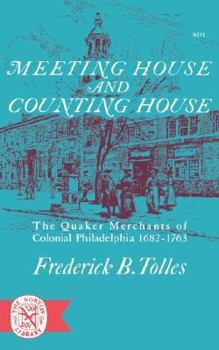Meeting House and Counting House: The Quaker Merchants of Colonial Philadelphia 1682-1763
Select Format
Select Condition 
Book Overview
The "holy experiment" of the Quakers involved political hegemony and economic wealth. Gradually the Quakers realized that they had become involved in the compromises fatal to the spiritual integrity... This description may be from another edition of this product.
Format:Paperback
Language:English
ISBN:039300211X
ISBN13:9780393002119
Release Date:January 1963
Publisher:W. W. Norton & Company
Length:292 Pages
Weight:0.65 lbs.
Dimensions:0.8" x 5.1" x 8.0"
Customer Reviews
1 rating
The Heyday of the Philadelphia Quakers
Published by Thriftbooks.com User , 16 years ago
As I noted previously in a review of Paul E. Johnson's A Shopkeeper's Millennium, an account of the rise of the industrial capitalists of Rochester, New York in the 1830's, in any truly socialist understanding of history the role of the class struggle plays a central role. Any thoughtful socialist wants to, in fact needs to, know how the various classes in society were formed, and transformed, over time. A lot of useful work in this area has been done by socialist scholars. One thinks of E.P. Thompson's The Making of the English Working Class, for example. One does not, however, need to be a socialist to do such research in order to provide us with plenty of ammunition in our fight for a better world. Frederick Tolles account of the importance of Philadelphia Quaker merchants in pre-revolutionary America is another such work. The last time we had heard from the Quakers in this space was as part of British historian Christopher Hill's The World Turned Upside Down, an account of the turbulent 1640-60 period in English revolutionary history where they formed one of the many sects that immerged from that experience (and were among the last armed defenders of the Cromwellian republican experiment). Well, in the reaction of the Stuart Restoration the Quakers got quiet, very quiet or immigrated from Merry Olde England. The immigrants who wound up in William Penn's Pennsylvania are the subject of this narrative. These Quakers brought their religion, but also their fierce sense of `calling' with them. As a result, for a period anyway, they formed the mercantile elite of that colony. Moreover, their success formed an important component for the latter industrial capitalist development of this region in the 19th century. As Professor Tolles cogently point out in the post- revolutionary Stuart Restoration period of Quaker persecution two trends developed both in England and America. One was a fierce sense of communitarianism as the Quakers faced the `world' and in aid of their fellow Quakers wherever they were and the other a need to be `making and doing' in the world. As they gained financial success some of the rough edges of their religious experiences faded into the past. This culminated in a three-quarter of a century political domination of colonial Pennsylvania. During this period they also left their imprint on many facets of social life. Professor Tolles details those developments, as well. The good professor spent some time going through the overall Quaker experience in Pennsylvania. The successful Quaker domination of trading and the crafts has been noted above. They also placed their imprint on the financial system, the social mores of the credit system, land use, architecture, the manner of dress, education and the use of personal and social time. Some of this overlaps with the general Puritan ethic of the period prevalent in most colonies but the Quaker experience is dominated by much more anguish over the tension between individual achi






